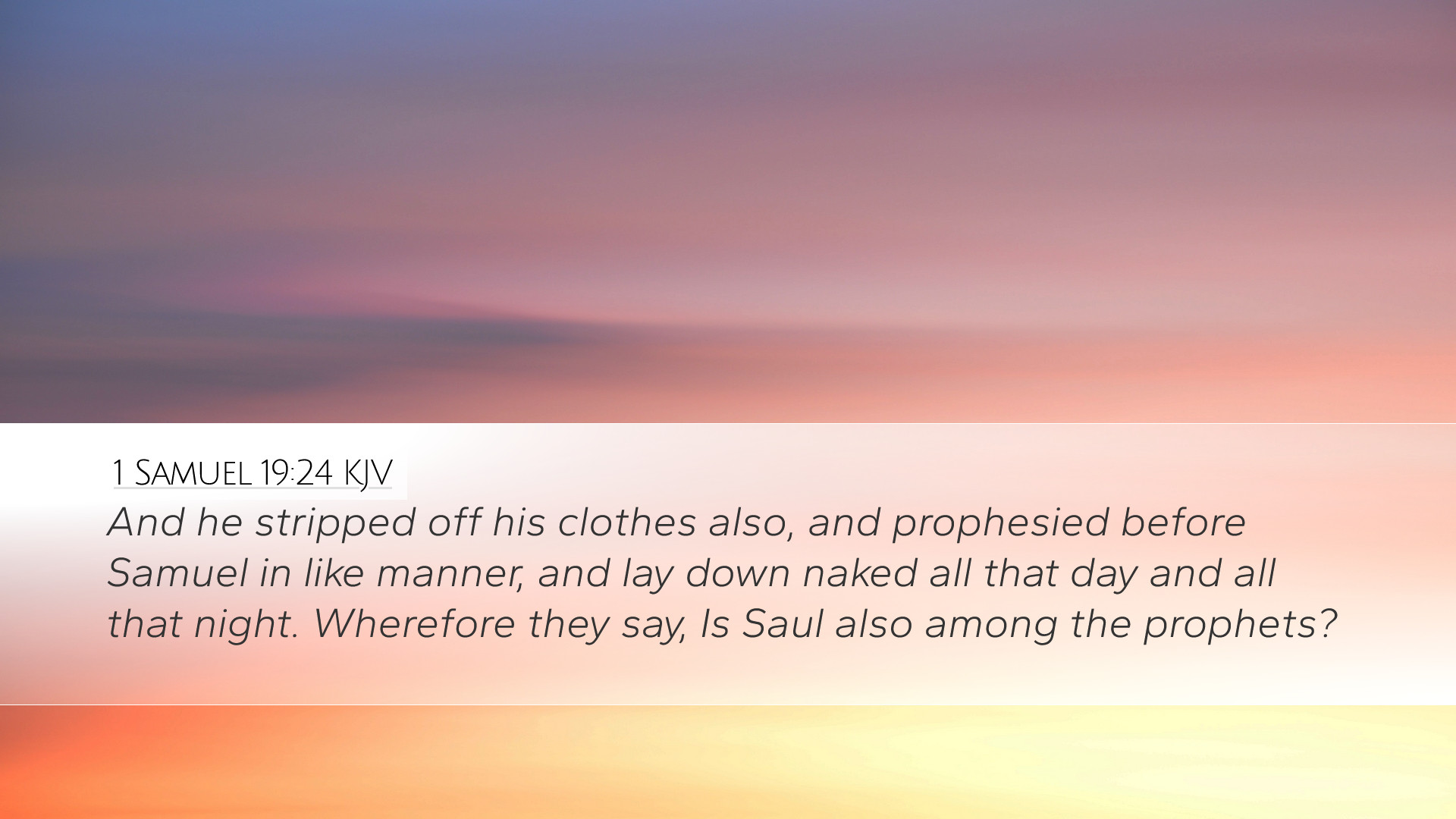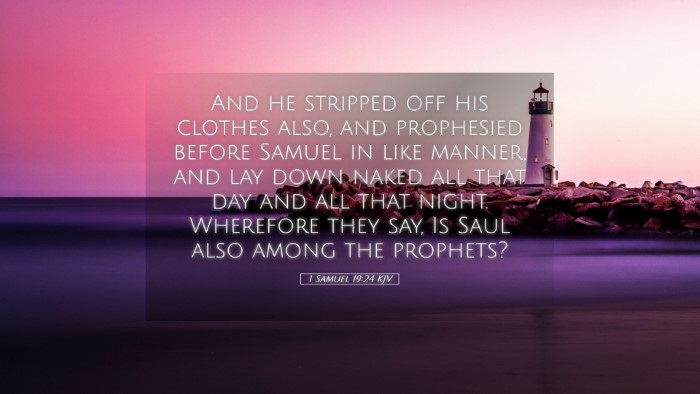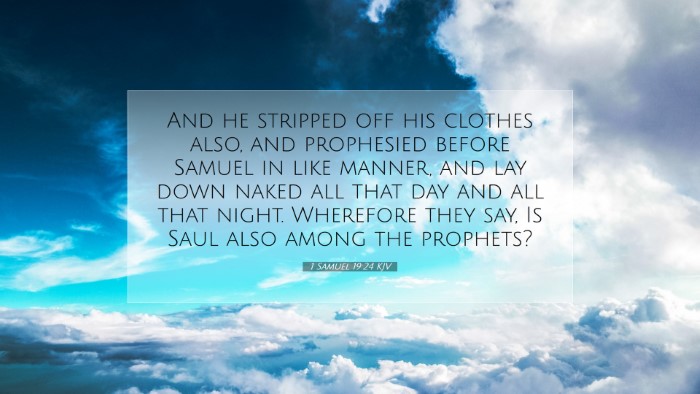Commentary on 1 Samuel 19:24
Bible Verse: "And he stripped off his clothes also, and prophesied before Samuel in like manner, and lay down naked all that day and all that night. Wherefore they say, Is Saul also among the prophets?" (1 Samuel 19:24, KJV)
Introduction
This verse captures a significant moment in the life of King Saul, marking a dramatic turn as he interacts with the prophetic community through Samuel. In this commentary, we will explore the implications and interpretations of this passage as derived from various public domain commentaries.
Context and Background
To understand 1 Samuel 19:24, it is essential to consider the broader narrative of Saul's kingship and his relationship with David and Samuel. Saul, once filled with the Spirit of God, experiences a decline due to his disobedience and jealousy towards David, who is anointed as the next king.
The Role of Prophets
Prophets in Israel were divinely appointed messengers who conveyed God’s will to the people. Samuel, the last judge of Israel and the prophet who anointed Saul, represents authority and divine guidance.
Analysis of the Verse
This verse contains several critical components that warrant exploration:
- Stripping of Clothes: The act of Saul stripping off his clothes signifies a profound humility and indicates a complete surrender to the influence of the Holy Spirit. As Matthew Henry notes, this act was not merely an exhibition of madness, but a submission to the prophetic spirit.
- Prophesying Before Samuel: Saul's prophesying indicates that despite his current disobedience and mental state, the Spirit of God still worked through him, a testimony to the complexities of divine grace as noted by Albert Barnes.
- Lay Down Naked: The description of Saul lying down naked is a stark contrast to his royal status. Clarke emphasizes that this was not only a humbling of himself but also a visible sign of being possessed by the Spirit of God, illustrating the transformative power of divine encounter.
- The Question: "Is Saul also among the prophets?": This rhetorical question highlights Saul's unexpected participation in prophetic ministry, and it serves as a reminder of God's ability to use unexpected vessels for His purposes despite human failings, as noted by Matthew Henry.
Theological Implications
This verse opens a conversation about the nature of divine calling and the complexities of human character. It forces the reader to grapple with the juxtaposition of Saul's anointing and his failure:
- God’s Sovereignty: God’s sovereignty is a recurring theme; even a flawed leader can be used for His glory. The fact that Saul prophesies under the Spirit's influence illustrates that God's plans can unfold through imperfect individuals.
- The Nature of Prophetic Worship: The act of prophesying is deeply rooted in worship and intimacy with God. This challenges readers to consider their own encounters with the divine and how those encounters might prompt an outpouring of worship.
- Identity and Status: The verse challenges societal norms concerning status and identity. Crafts by Clarke suggest that true identity is found in the presence of God rather than in title or position, which is illustrated by Saul’s public humiliation.
- Warning Against Disobedience: Saul's story serves as a cautionary tale about the consequences of disobedience. Despite experiencing the Spirit's power, Saul ultimately fails to obey God’s commands, leading to his tragic downfall, reminding us of the essential requirement of fidelity to God.
Pastoral Application
For pastors and church leaders, 1 Samuel 19:24 can serve as a profound lesson in humility and the recognition of God’s larger plan, even through our weaknesses. Key points include:
- The Importance of Accountability: Just as Saul was in the presence of Samuel during this significant moment, leaders should seek out accountability and correction from spiritual mentors.
- Recognizing God’s Spirit in Unlikely Places: This passage encourages believers to remain open to the work of the Holy Spirit, recognizing that God can work powerfully through even those who seem to be unlikely vessels.
- Responding to Divine Encounter: Individuals must be encouraged to respond appropriately to the work of the Spirit in their lives, leading to a heart posture of worship and surrender.
- Warning Against Complacency: Finally, the story of Saul urges a posture of vigilance in our spiritual lives, avoiding the pitfalls of disobedience and apathy that can lead to spiritual decline.
Conclusion
In summary, 1 Samuel 19:24 encapsulates the dramatic interplay between divine sovereignty and human fragility. As reflected in the insights drawn from various commentaries, this verse serves as a timeless reminder of the complexities of the human experience in relation to God’s divine purpose. It urges all readers, especially pastors and theologians, to acknowledge the profound ways in which God interacts with His creation, regardless of our imperfections.
This passage also emphasizes the need for continual reliance on God's grace, the importance of humility in leadership, and the reality that God's plans often unfold in unexpected ways.


